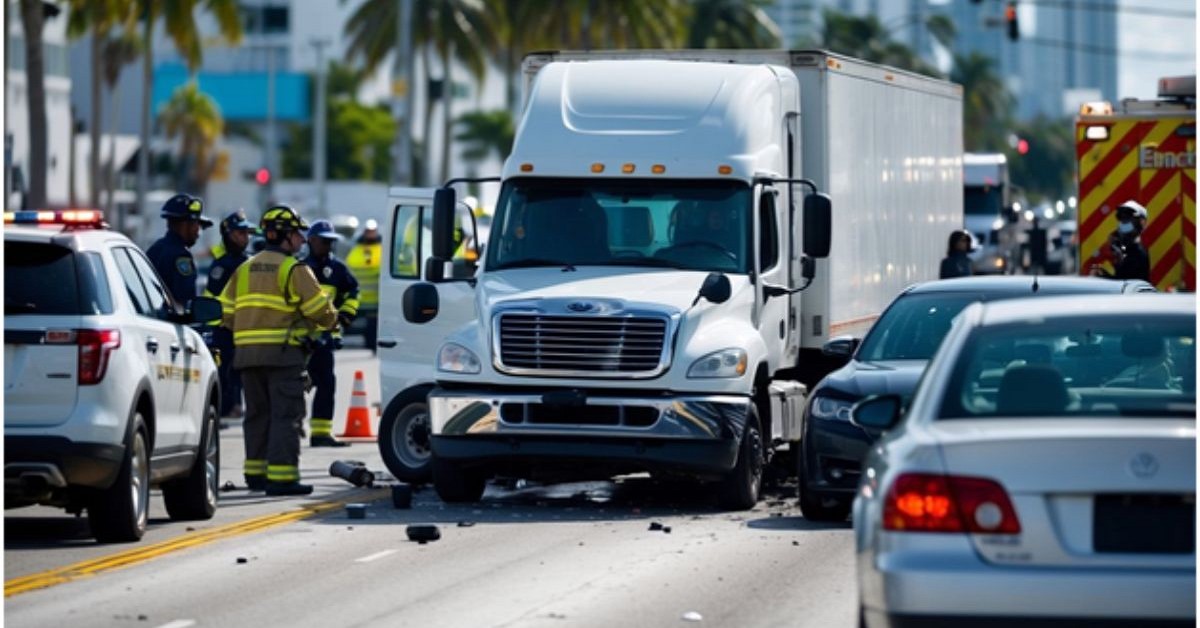Liability in Miami truck accidents involves a complex web of factors, including negligence, driver error, and equipment failure. Understanding who is legally responsible often hinges on demonstrating negligence, whether it be the truck driver, the trucking company, or other entities involved. This makes the process of determining liability a critical step for those seeking compensation for their injuries and damages. Often, you need help from a truck accident lawyer in order to do so.

Truck accidents in Miami can result from various causes such as faulty equipment, driver fatigue, and improper loading of cargo. Each of these elements can implicate different parties, from the truck driver to the cargo owner or even the manufacturer of truck parts. Identifying these responsible parties is essential for building a strong legal case.
To navigate these complexities, it's crucial to gather substantial evidence and consult with legal experts specializing in truck accidents.
Assessing Liability in Truck Accidents
Assessing liability in truck accidents involves determining fault among various parties, adhering to federal and state regulations, and understanding the role of commercial truck insurance. These elements are essential for ensuring proper compensation and legal responsibility.
Determining Fault in Complex Scenarios
In truck accidents, liability can be shared among multiple parties, including the truck driver, the trucking company, the owner of the cargo, or even the manufacturer of the truck or its parts. Establishing fault requires examining evidence such as driver logs, maintenance records, and eyewitness testimony.
For example, the truck driver may be liable if found to be driving under the influence or violating traffic laws. Similarly, the trucking company might be responsible for negligent hiring practices or inadequate vehicle maintenance. Thorough investigation and expert analysis are crucial in these scenarios.
Federal and State Regulations Impacting Liability
Both federal and state regulations play a significant role in determining liability in truck accidents. The Federal Motor Carrier Safety Administration (FMCSA) imposes rules regarding drivers' hours of service, vehicle maintenance, and cargo securement. Violations of these regulations can directly impact liability.
State-specific laws can also influence the determination of fault. For instance, Florida law requires a thorough understanding of comparative negligence, where multiple parties may share responsibility for an accident. Compliance with these regulations is critical, as non-compliance can lead to increased liability for the responsible parties.
The Role of Commercial Truck Insurance
Commercial truck insurance policies are comprehensive due to the high risks involved. These policies often cover a range of incidents, including property damage, bodily injury, and cargo loss. Insurance companies play a vital role in negotiating settlements and determining the compensation for victims.
Truck accident lawyers frequently engage with these insurers to ensure fair compensation for their clients. Understanding the complexities of insurance claims, including policy limits and exclusions, is essential for anyone involved in a truck accident. Insurance coverage details often make a significant difference in the outcomes of these cases.
Legal Recourse and Compensation
In Miami, those involved in truck accidents have various options to seek compensation for damages. Key considerations include navigating personal injury claims, understanding how comparative negligence impacts compensation, and knowing the steps involved in settlements and litigation.
Navigating Personal Injury Claims
Victims can file personal injury claims to seek compensation for medical expenses, lost wages, and other damages. In Miami, it's crucial to gather evidence, such as medical records, witness statements, and accident reports, to support the claim.
Legal representation can enhance the likelihood of a successful claim by ensuring all necessary documentation is properly filed and deadlines are met. It's essential to act quickly since Florida has a statute of limitations that typically restricts the filing of personal injury claims to four years from the accident date.
The Significance of Comparative Negligence
Florida follows the principle of comparative negligence, which can affect the amount of compensation a victim receives. If the injured party is found partially at fault for the accident, their compensation will be reduced by their percentage of fault.
For example, if a victim is deemed 20% responsible, their compensation will be reduced by 20%. This makes it imperative to clearly establish the degree of liability of all parties involved, including the truck driver and the trucking company.
Settlements and Litigation in Truck Accident Cases
Many truck accident cases are resolved through settlements rather than going to trial. Settlements can provide a quicker compensation compared to lengthy court proceedings.
However, if a settlement cannot be reached, litigation may be necessary. Experienced legal representation is crucial in these scenarios to navigate the complexities of court procedures and advocate effectively for fair compensation.
Settlements often involve negotiations between the victim's attorney and the responsible party's insurance company, aiming to agree on a fair compensation amount based on the damages sustained.
Join LAWyersClubIndia's network for daily News Updates, Judgment Summaries, Articles, Forum Threads, Online Law Courses, and MUCH MORE!!"
Tags :Others









